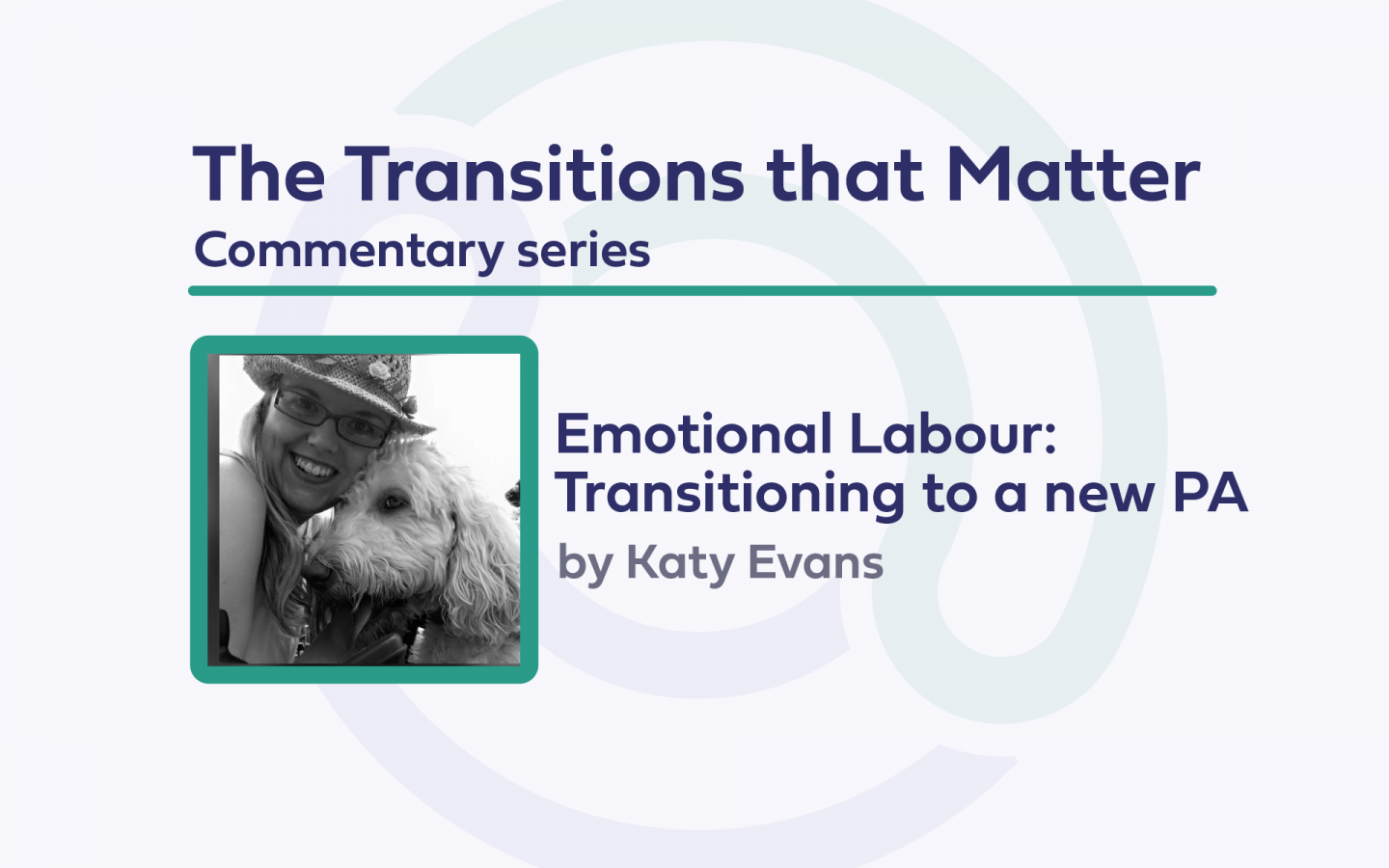This is a guest commentary. The views and opinions of the author may not always represent those of the Centre for Care.
Emotional Labour: Transitioning to a new PA
I have employed Personal Assistants (PAs) for over ten years through a Direct Payment. The choice and control this gives me enables me to employ people I choose and the freedom to plan my support around my life. However, this comes at a cost which is scarcely acknowledged. In discussions around compassion fatigue and burnout in the health and social care sector, there has been little acknowledgement of the fatigue disabled individual employers have experienced. We are frequently on the sharp end of cuts and through Covid we battled to keep ourselves and our employees safe with insufficient support and information. This labour is particularly evident at the point of transitioning to a new PA. This blog will look at some of the aspects of the transition between a current and new PA.
Practicalities
When a PA leaves and I need to employ a new PA there are numerous practical elements involved such as writing and distributing adverts, answering several daily emails, organising interview schedules and conducting interviews. This is made harder because I don’t have access to the resources most employers have such as dedicated HR teams. As a result, I am often jumping through hoops just to get an advert posted on one website. It’s therefore necessary to be creative with where and how I advertise but this takes a lot of time and energy. I often have to turn down paid work whilst I am recruiting because it is so all-consuming. A huge frustration I feel is that my role in managing my Direct Payment is not recognised and I am expected to do this work for free. The need to manage recruitment can come at any time: I have done this whilst on holiday as well as during a mental health crisis. There is no annual leave from being a PA employer just as there is no break from being disabled.
Emotional Labour
Due to the essential role PAs play in my life, when someone resigns I feel pressure to act immediately to recruit someone else. This leaves little opportunity to grieve the ending of what can be a long and close relationship. Equally, some PA relationships do not end on good terms and it can be helpful to process this before moving into another relationship but this is rarely possible due to the pressure to recruit again. Despite experiencing some relief in this situation, there is also the fear I have that no matter how bad things were, someone feels better than no one in the unpredictable climate of PA recruitment. With the need to recruit someone else, comes the fight and flight fear of how I’ll cope if I don’t find anyone. When I rely on PAs to stay alive, time isn’t a luxury I have. The practicalities described above also demand huge amounts of emotional labour. Putting an advert into the public domain means dealing with intrusive questions and inappropriate comments from strangers. At points I have been intimidated by the sexual harassment I have received when I’ve been forced to justify my request for female applicants due to personal care requirements. The issues with PA’s low pay is well known to make recruitment harder. To negate this, I exert huge amounts of emotional labour trying to sell a job that is paid so little, yet is vital to my life.
Transition
At the heart of this blog is the transition from one PA to another. It is difficult to say goodbye to a trusted PA who is in tune with your requirements. In addition, the intimate knowledge they are taking with them about my body and my life is made harder by the power imbalance of me knowing considerably less about them, especially as I have always been the only one naked. The trust necessary to transition to someone else does not come over night, especially as I am an abuse survivor and feel particularly vulnerable when I’m naked. However, I am repeatedly forced to ignore these fears as I need help from my PAs to shower on their first day despite them practically being strangers. In addition to managing my anxiety, I am often managing their awkwardness, especially if it is their first time doing this work, by exerting emotional labour to lighten the atmosphere and put them at ease.
Training someone new involves remembering the things they need to know, balanced with the awareness of not overwhelming them; answering multiple questions; being patient when things take double the time; being conscious of the pressure to ‘start as you mean to go on’. Underlying all this is the fear that you have not employed the right person and the risk you will go through this all over again if things don’t work out. At times I have had a run of bad luck, causing me to experience several PA transitions in a short space of time. This has been physically and emotionally exhausting as well as causing me to question if this was a reflection on me as a person, given the personal nature of this type of work.
In addition to the transition between PAs, a PA leaving is usually due to a transition in their life such as pregnancy, new job or moving areas. This brings into sharp focus how my life is often on a different trajectory to what is expected for most people my age and can heighten moments of grief for missed milestones.
This blog has highlighted both the practical and emotional labour of transitioning from one PA to another. It is work I, as a disabled person, am forced to undertake if I am to have my basic needs met and have any quality of life. I am hugely grateful for the choice and control my Direct Payment affords me and the support I’ve had from some wonderful PAs over the years. However, with this comes huge amounts of work on my part that is largely undervalued and unrecognised. In the conversations around social care, the daily work disabled people undertake needs to be better recognised and supported.





